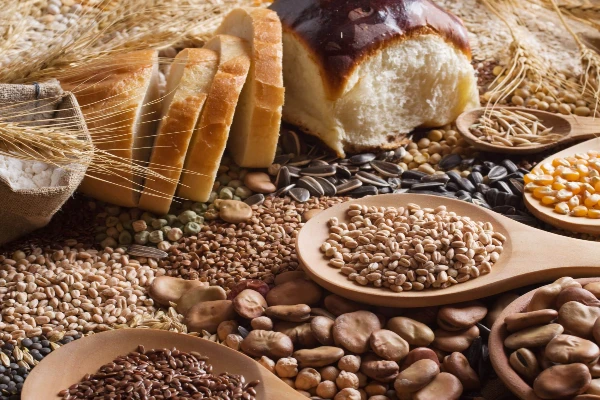Whole grains 6 benefits, side effects, calories
Whole grains Nutrition

| Whole grains (100g) Nutrition | |||
| Carbohydrate | Protein | Fat | Calories |
| 41g | 13g | 3.4g | 247kcal |
| Main Nutrition | Dietary fiber, polyphenol | ||
| Main Benefits | Improves diabetes, loses weight, relieves stress, prevents cardiovascular disease | ||
| Side Effects | Excessive intake causes indigestion and amino acid deficiency | ||
Whole grains are wheat that has had only the outer husk removed and has not been polished. Although it is relatively high in calories, it is often used as food because it is rich in various nutrients. It is especially rich in dietary fiber. Whole grains are light brown in color and have a hard and gritty texture. However, it has a unique flavor, so it can be brewed as a tea and eaten as is, or made into powder and used in confectionery and baking. It is also widely used in desserts such as cookies.
Whole grains benefits

1. Improvement and prevention of diabetes
One of the main benefits of whole grains is controlling blood sugar levels. Research supports this, showing that people who consistently consumed whole grains had a lower risk of diabetes. Whole grains are rich in dietary fiber, which helps with weight control. This effect can help prevent obesity, one of the risk factors for diabetes. Whole grains also have lower sugar levels than wheat flour. Therefore, consuming whole grains instead of flour helps maintain blood sugar by preventing rapid rises in blood sugar.
2. Cardiovascular health
Whole grains help improve cardiovascular health and lower the risk of cardiovascular disease. Whole grains contain more dietary fiber than other refined grains. High dietary fiber helps lower cholesterol levels by preventing bad cholesterol from being absorbed into the body. This lowers the risk of cardiovascular disease. Additionally, the various vitamins contained in whole grains help regulate blood pressure and improve blood circulation, thereby improving blood vessel health. In addition, consuming whole grains is effective in inhibiting the formation of blood clots.
3. Lose weight
Whole grains are well known to contain a lot of dietary fiber. Dietary fiber is digested slowly even when consumed in small amounts, making you feel fuller for a longer period of time. This same effect helps you eat less food when losing weight. Additionally, dietary fiber stimulates intestinal motility and aids bowel movements. This is effective in preventing constipation that often occurs when losing weight.
4. Antioxidant action
Whole grains contain a variety of substances, one of which is polyphenol. Polyphenols act as powerful antioxidants in our bodies. This helps protect our body from free radicals in the body. Whole grains also contain vitamin E, which also helps eliminate oxidative stress created by free radicals. This helps keep cell membranes healthy and prevents cells from aging.
5. Prevent stress and insomnia
In oriental medicine, it is said that whole grains help settle vases. This is because whole grains help secrete a hormone called serotonin. Serotonin is called a kind of happiness hormone, and it helps relieve stress. In addition, it is effective in stabilizing the mind and body, so consuming whole grains helps those suffering from stress. Whole grains also contain tryptophan. This ingredient stimulates nerve cells and can help improve sleep disorders such as insomnia.
6. Gut health
Whole grains have a higher content of dietary fiber than other grains. The high content of dietary fiber helps improve gut health. Dietary fiber helps maintain an appropriate ratio of beneficial and harmful bacteria in the intestines. This is effective in improving the intestinal environment. Additionally, consuming whole grains helps promote bowel movements and smooth bowel movements. This is effective in preventing intestinal diseases such as colon cancer by eliminating harmful substances in the intestines.
Side Effect
- Whole grains are lacking in amino acids. Therefore, if you consume too much whole grains, you will have difficulty replenishing amino acids.
- Many people eat whole grain bread instead of bread to lose weight. However, since most breads sold commercially only have a little added flour, they may not be of great help in weight loss.
- Bread made from whole grains has a rough texture, so you must chew it thoroughly for a long time before eating.
References
🔹Health: Whole Grains: Benefits, Nutrition, and Facts
🔹NIH: Health Benefits of Dietary Whole Grains
🔹CACFP: Health Benefits of Whole Grains